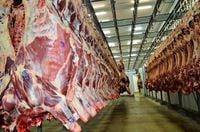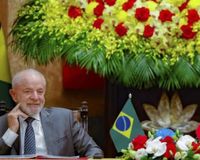On March 28, 2025, Brazilian President Luiz Inácio Lula da Silva announced a significant breakthrough in international trade: Brazil will export meat to Vietnam after more than 20 years of attempts. This landmark decision was made during a meeting with Vietnamese Prime Minister Pham Minh Chinh in Hanoi, marking a pivotal moment in the economic relationship between the two nations.
In a video shared on social media, Lula expressed his enthusiasm, stating, "After many years of attempts, the Prime Minister announced that he will finally buy Brazilian meat for the Vietnamese market. This is extraordinary news and I believe it is very important for both Vietnam and Brazil." The agreement comes as part of a broader action plan aimed at strengthening the strategic partnership between Brazil and Vietnam.
The Brazilian delegation included prominent figures such as Davi Alcolumbre, President of the Senate, and Hugo Motta, President of the Chamber of Deputies. Lula noted that their presence was crucial in securing the agreement, emphasizing that it showcased the strength of the friendship Brazil aims to foster with Vietnam. "What caused the Prime Minister's decision was the presence of the Senate and Chamber presidents, which showed the strength of the friendship we want to have with Vietnam," Lula remarked.
As part of the action plan, Vietnam will open its market to Brazilian beef, a move that Lula believes will attract investments from Brazilian meatpacking companies. He stated, "The opening of the Vietnamese market for Brazilian beef will attract investments from Brazilian slaughterhouses to make this country an export platform for Southeast Asia." This development is expected to significantly boost Brazil's meat industry, allowing for the export of up to 300,000 tons of beef to Vietnam, according to Roberto Perosa, President of the Brazilian Association of Exporting Meat Industries (ABIEC).
Perosa, who accompanied the Brazilian delegation, highlighted the importance of this agreement, stating, "The Brazilian beef producer and industry will have more opportunities to diversify the sending of products abroad, ensuring domestic supply in Brazil and complementing income with exports to the Asian market. This is a very happy moment for the beef industry."
The agreement not only opens doors for beef exports but also reinforces Vietnam's position as a key partner for Brazil. Historically, Vietnam has been a significant source of imports for Brazil, ranking as the 14th largest supplier of products to the South American nation. In fact, Brazil exports more to Vietnam than to several European countries, including Portugal, the United Kingdom, and France.
Currently, Brazil supplies about 70% of the soybeans imported by Vietnam, making it the main supplier of this essential agricultural product. Additionally, Brazil is the leading provider of pork to Vietnam, accounting for approximately 37% of its imports, and holds the position of the second-largest supplier of chicken and cotton.
The opening of the beef market is expected to enhance Brazil's agricultural exports further, with Lula asserting that it will create new opportunities for the meatpacking sector. He also mentioned ongoing negotiations for the sale of Embraer jets to Vietnam Airlines, indicating a desire to expand Brazil's commercial ties beyond agriculture.
In the context of this growing partnership, Lula expressed optimism about the future of Brazilian exports, stating, "We will work towards an agreement with Vietnam that is balanced and benefits both sides." The Brazilian presidency of the Mercosur trade bloc, which begins in July, will prioritize negotiations with Vietnam, potentially leading to a comprehensive trade agreement.
The implications of this agreement extend beyond mere trade statistics. It symbolizes a strengthened bilateral relationship, showcasing Brazil's commitment to enhancing its presence in the Southeast Asian market. As both countries move forward, the collaboration is expected to yield positive outcomes for their economies, particularly in the agricultural sector.
As the Brazilian government continues to seek new markets and opportunities, the successful opening of the Vietnamese beef market stands as a testament to the potential for growth in international trade. With the groundwork laid for deeper economic ties, the future looks promising for both Brazil and Vietnam as they embark on this new chapter of cooperation.






